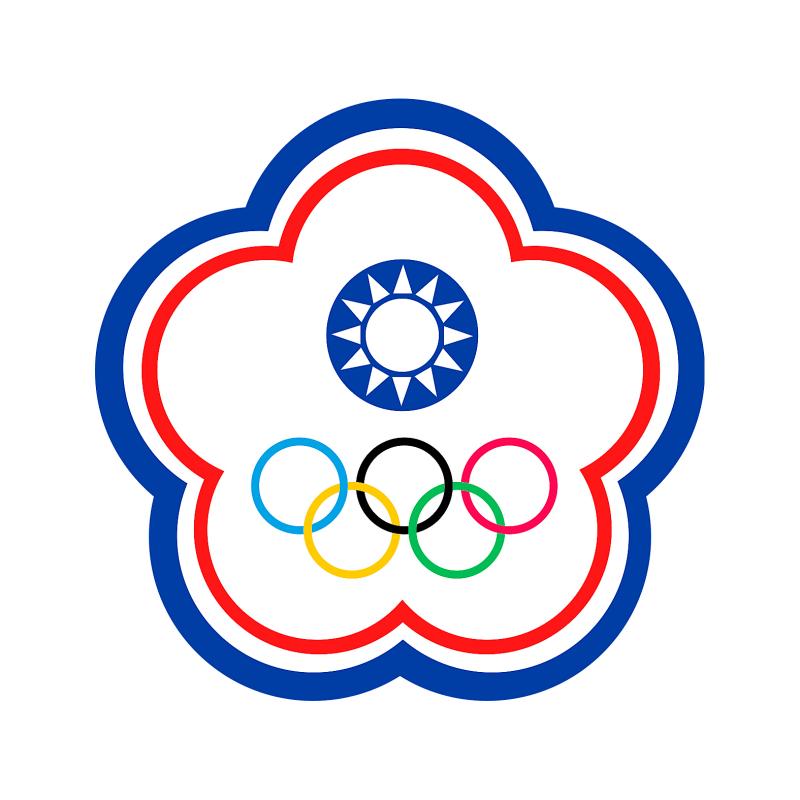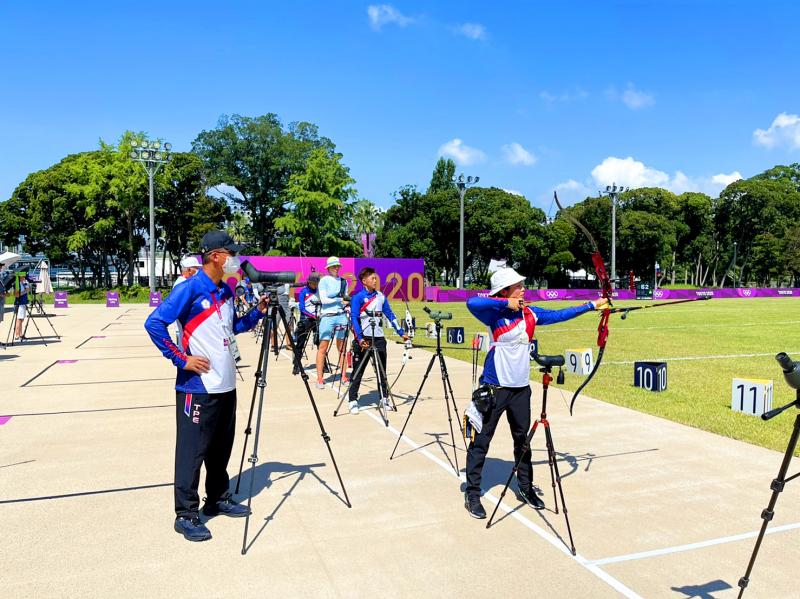Lawmakers yesterday questioned ties between members of the Chinese Taipei Olympic Committee (CTOC) and the Chinese Nationalist Party (KMT), calling for “transitional justice” after a controversy over airplane seating for Taiwan’s Olympic athletes.
As the Olympic delegation left for Japan on Monday, badminton player Tai Tzu-ying (戴資穎) wrote on Instagram that she missed the roominess of the seating in EVA Airways’ business class, which drew apologies from President Tsai Ing-wen (蔡英文), Premier Su Tseng-chang (蘇貞昌) and other officials, as Tsai in 2016 had pledged that all athletes and their coaches would fly in business class to international competitions.
Democratic Progressive Party (DPP) Legislator Huang Kuo-shu (黃國書) yesterday said that in Taiwan, as in most countries, non-governmental organizations run the national Olympic committee so that politics do not interfere.

Screen grab from the committee’s Web site.
The DPP administration does not make decisions for the Olympic delegation, Huang said.
The Sports Administration gives the CTOC the funds for the Olympics, but the administration has no say in the committee’s decisions, otherwise it would not be in compliance with the International Olympic Committee’s charter — most Taiwanese do not understand this, he added.
While Olympic athletes being seated in economy class sparked a public furor, pan-blue politicians placed the blame on the president and the DPP government, saying that they had betrayed the athletes’ trust and deceived the public.

Photo courtesy of Ni Tai-chih
On Wednesday, Taiwan Statebuilding Party Legislator Chen Po-wei (陳柏惟) said that the CTOC and most sports governing bodies in Taiwan are either controlled by KMT members, affiliated with them, or controlled by businesspeople with close KMT ties.
CTOC president Lin Hong-dow (林鴻道) is the second-generation owner of property-development conglomerate Hung Kuo Corp (宏國建設) and his mother, Lin Hsieh Han-chien (林謝罕見), was a high-ranking KMT official, Chen said.
CTOC vice president Chen Shyh-kwei (陳士魁) was Executive Yuan secretary-general under former president Ma Ying-jeou (馬英九), while CTOC top adviser Sun Lih-chyun (孫立群) was Executive Yuan spokesman under Ma, Chen added.
Sports in Taiwan need transitional justice, Chen said.
“Changes must be made to allow new members and the younger generation into these sports bodies,” Chen said.
KMT-affiliated officials take up the top posts, not because of their sports expertise or experience in sports business, but because of their loyalty to the KMT during the party’s authoritarian regime, he said.
DPP Legislator Rosalia Wu (吳思瑤) said that many athletes and citizens are demanding that the CTOC and Taiwan’s other sports governing bodies have greater transparency and better accountability, including calls for another round of sports reform, following amendments to the National Sports Act (國民體育法) in 2017.
The Sports Administration allocated NT$150 million (US$5.35 million) to the CTOC, which decided on how to spend the money without lawmakers or the public, Wu said.
“These entrenched problems keep recurring, especially with the CTOC, where Olympic athletes get angered and complain to the public,” Huang said. “So it is once again time to push for reform at the CTOC and other sports governing bodies, to make changes and make them more accountable and transparent.”

The Grand Hotel Taipei on Saturday confirmed that its information system had been illegally accessed and expressed its deepest apologies for the concern it has caused its customers, adding that the issue is being investigated by the Ministry of Justice Investigation Bureau. The hotel said that on Tuesday last week, it had discovered an external illegal intrusion into its information system. An initial digital forensic investigation confirmed that parts of the system had been accessed, it said, adding that the possibility that some customer data were stolen and leaked could not be ruled out. The actual scope and content of the affected data

‘LIKE-MINDED PARTNER’: Tako van Popta said it would be inappropriate to delay signing the deal with Taiwan because of China, adding he would promote the issue Canadian senators have stressed Taiwan’s importance for international trade and expressed enthusiasm for ensuring the Taiwan-Canada trade cooperation framework agreement is implemented this year. Representative to Canada Harry Tseng (曾厚仁) in an interview with the Central News Agency (CNA) said he was increasingly uneasy about Ottawa’s delays in signing the agreement, especially as Ottawa has warmed toward Beijing. There are “no negotiations left. Not only [is it] initialed, we have three versions of the text ready: English, French and Mandarin,” Tseng said. “That tells you how close we are to the final signature.” Tseng said that he hoped Canadian Prime Minister Mark Carney

President William Lai (賴清德) yesterday bestowed one of Taiwan’s highest honors on Saint Vincent and the Grenadines (SVG) Ambassador Andrea Clare Bowman in recognition of her contributions to bilateral ties. “By conferring the Order of Brilliant Star with Grand Cordon on Ambassador Bowman today, I want to sincerely thank her, on behalf of the Taiwanese people, for her outstanding contribution to deepening diplomatic ties between Taiwan and SVG,” Lai said at a ceremony held at the Presidential Office in Taipei. He noted that Bowman became SVG’s first ambassador to Taiwan in 2019 and

A man walks past elementary school artworks at the Taipei Lantern Festival in Ximen District yesterday, the first day of the event. The festival is to run from 5pm to 10pm through March 15.